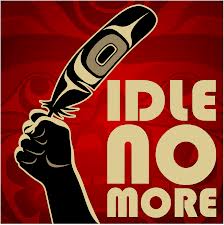First Nations Indigenous Resistance and Haiti’s Challenges
Global Research News Hour Episode 11

Global Research News Hour Episode 11
“We have had enough. Our young people have had enough. Our women have had enough … we have nothing left to lose… These are demands, not requests … the Idle No More movement has the people, it has the people and the numbers that can bring the Canadian economy to its knees. It can stop Prime Minister Stephen Harper’s resource development plan.”
-Assembly of Manitoba Chiefs Grand Chief Derek Nepinak
Idle No More Re-visited
This past weekend, the long-awaited meeting between the Prime Minister and First Nations Chiefs took place in Ottawa. Not all of the First Nations leaders were in attendence.
The meeting took place the same week a devastating audit of the Attawapiskat First Nation was conveniently leaked. This audit served to distract the mainstream media and much of the public away from the core issues animating the Idle No More movement while smearing one of the movement’s most identifiable, and sympathetic figures.
While Assembly of First Nations Grand Chief Shawn Atleo recuperates from an illness, Idle No More protests have continued unabated, including on Wednesday January 16th’s National Day of Action which included rail and road blockades in Ontario, Manitoba and New brunswick.
John Schertow is a Mohawk and Indigenous activist who has through his alternative news site ‘intercontinentalcry.org‘ tracked and monitored hundreds of Indigenous Peoples’ struggles around the world. In this feature length interview, Mr. Schertow addresses the role of the Assembly of First Nations in Canada in relation to INM, what was accomplished during last Friday’s meeting with the Prime Minister, and what the movement can and should learn from other struggles if it is to prevail.
Haiti’s Challenges
On January 12, 2010, a 7.0 MW earthquake with an epicentre 25 km west of Haiti’s capital Port-Au-Prince caused extensive damage to Port-Au Prince, Jacmel, and other settlements in the region. Hundreds of thousands were killed and over a million made homeless. THe world’s attention was riveted to the region. Concerned citizens in Western Europe, the US and Canada opened up their wallets and donated generously to NGOs, and institutions such as the International Committee of the Red Cross, believing they would be assisting the most needy and destitute Haitians.
Three years, a cholera epidemic and 6 billion dollars in foreign aid later, Haiti still struggles to recover from that massive natural disaster. What are the essential impediments to the social and material reconstruction of this island nation?
Jean St-Vil, an Ottawa based writer, artist and activist has been to Haiti a few times since the quake. In part two of the program he comments on the forces undermining progress for Haiti, which he believes can be traced to the UN, and the international community at large, including Canada.
LISTEN TO THE SHOW
Length (57:54)
Click to download the audio (MP3 format)
The Global Research News Hour hosted by Michael Welch airs on CKUW 95.9FM in Winnipeg Thursdays at 10am CDT. The programme is broadcast weekly by CKUW News, 95.9 FM out of Winnipeg, MB, and on Canadian community radio networks. The weekly programme is available for download on the Global Research website.

